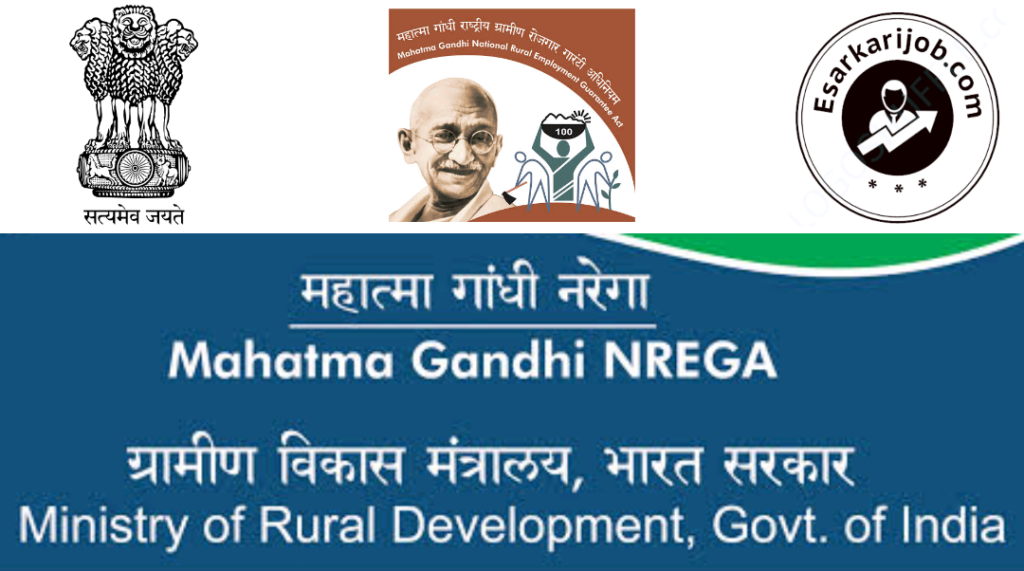The Mahatma Gandhi National Rural Employment Guarantee Act ( MGNREGA ) and also known as Mahatma Gandhi National Rural Employment Guarantee Scheme ( MNREGS ) is Indian legislation enacted on 25th August, 2005. The MGNREGA provides a legal guarantee for 100 days of employment in every financial year to adult members of any rural household People willing to do public work-related unskilled manual work at the statutory minimum wages. (MRD) The Ministry of Rural Development, Government of India is monitoring the entire implementation of this scheme in association with state government’s.

- This act was introduced with an aim of improving the purchasing power of the rural people, primarily semi or un-skilled work to people living (BPL) below poverty line in rural India. It attempts to bridge the gap between the rich & poor in the country. Roughly One-Third (1/3) of the stipulated work force must be women.
- Adult members of rural households submit their Name, Age & Address with photograph to the Gram Panchayat. The Gram Panchayat registers households after making enquire & issues a job cards. The job card contains the details of adult member enrolled & his / her photograph. Registered person can submit an application for work in writing (for at least 14day’s of continuous work) either to Panchayat or to Programme Officer.
- The Panchayat / Programme officer will accept the valid application & issue dated receipt of applications, letter providing work will be sent to the applicant & also displayed at Panchayat Office. The employment will be provided within a radius of 5 km: if it is above 5km extra wage will be paid.
Key facts that users should know about MGNREGA
- MGNREGA guarantees 100 days of wage employment in a financial year, to a rural household whose adult member’s volunteer to do unskilled manual works.
- Individual beneficiary oriented works can be taken up on the cards of (SC) Scheduled Castes & (ST) Scheduled Tribes, small or marginal farmers or beneficiaries of land reforms or beneficiaries under the Indira Awaas Yojana of the Government of India.
- Within 15days of submitting the application (OR) from the day work is demanded, wage employment will be provided to the applicants.
- Right to get unemployment allowance in case employment is not provided to people within 15 days of submitting the application or from the date when work is sought.
- Receipt of wages within 15 days of work done.
- Variety of permissible works which can be taken up by the Grama Panchayat.
- MGNREGA focuses on the social empowerment of women and economic.
- MGNREGA provides “Green” and “Decent” work.
- Social Audit of MGNREGA works are mandatory, which lends to accountability & transparency.
- MGNREGA works address the climate change the vulnerability and protect the farmers from such risks & conserve natural resources.
The Grama Sabha is the principal forum for wage seeker’s to raise their voices & make demands. It is the Grama Sabha & the Gram Panchayat which approves the shelf of works under MGNREGA & fix their priority’s.
Activities covered under MGNREGA
- Union Rural Development Ministry has notified work’s under MGNREGA, majority of which are related to the agricultural & allied activities, besides the works that will facilitate rural sanitation projects in a major way.
- The works have been divided into TEN broad categories like Watershed, Irrigation & Flood management works, Agricultural & Livestock related works, Fisheries & works in coastal areas and the Rural Drinking water & Sanitation related works.
- Briefing the MGNREGA 2.0 (the 2nd generation reforms for the rural job scheme) the priority of the works will be decided by the Gram Panchayats in meetings of the Gram Sabhas & the Ward Sabhas.
- The Rural development also informed that the 30 new works being added in the Schedule 1 will also help the.
- Rural sanitation projects, as for the first time toilet building, soak pits & solid & liquid waste management have been included under MGNREGA. Though the overall 60:40 ratio of labour & material component will be maintained at the Gram Panchayats level but there will be some flexibility in the ratio for certain works based on the practical requirement’s.
- Construction of AWC building has been included as an approved activity under the MGNREGA. ‘Guidelines for construction of Anganwadi Centres’ under MGNREGS have been issued jointly by Secretary, WCD & Secretary, Ministry of Rural Development, on 13th August, 2015. Under MGNREGS, expenditure up to Rs.5lakhs per AWC building for construction will be allowed. Expenditure beyond Rs. 5 akhs per AWC including finishing, flooring, plumbing, painting, wood work, electrification, etc. will be met from the ICDS funds.
- Online Public Grievances Redressal System CLICK HERE
Special Category of Workers (Vulnerable Groups) under MGNREGA
The special category of workers are from:
- Persons with disabilities
- Primitive Tribal Groups
- Nomadic Tribal Groups
- De-notified Tribes
- HIV positive persons
- Internally displaced persons
- Rehabilitated bonded labour
- Women in special circumstances
- Senior citizens above 65 years of age
SOURCE: MGNREGA PORTAL
| CLICK HERE FOR LATEST GOVERNMENT JOBS |